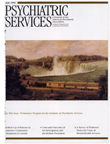The importance of ward atmosphere in inpatient treatment of schizophrenia on short-term units
Abstract
OBJECTIVE: The reorganization in 1981 of a general hospital psychiatric ward in Oslo, Norway, to achieve a more suitable treatment milieu for patients with schizophrenia resulted in a change in patients' perceptions of the ward atmosphere. Reduced group participation and increased individualized support from staff led patients to perceive of the ward as having a low level of anger and aggression and a high level of order and organization. This study examined whether the reorganization was associated with improved treatment outcome. METHODS: Psychiatrists retrospectively examined the charts of all patients with a DSM-III-R diagnosis of schizophrenia or schizophreniform disorder who were admitted to the ward the year before and the second year after the reorganization. Multiple regression analyses were used to examine treatment outcomes for both groups. Outcome was measured indirectly by length of stay, level of functioning at discharge, and whether the patient was rehospitalized during the following seven years. RESULTS: Patients treated after the reorganization had significantly shorter stays with no reductions in either level of functioning at discharge or length of community tenure after discharge. Differences in demographic characteristics, illness history, or psychopharmacological treatment could not account for differences in outcome. CONCLUSIONS: The results supported the hypothesis that the organization and milieu of brief-stay wards influence the short-term outcome of inpatient treatment of patients with schizophrenia.
Access content
To read the fulltext, please use one of the options below to sign in or purchase access.- Personal login
- Institutional Login
- Sign in via OpenAthens
- Register for access
-
Please login/register if you wish to pair your device and check access availability.
Not a subscriber?
PsychiatryOnline subscription options offer access to the DSM-5 library, books, journals, CME, and patient resources. This all-in-one virtual library provides psychiatrists and mental health professionals with key resources for diagnosis, treatment, research, and professional development.
Need more help? PsychiatryOnline Customer Service may be reached by emailing [email protected] or by calling 800-368-5777 (in the U.S.) or 703-907-7322 (outside the U.S.).



